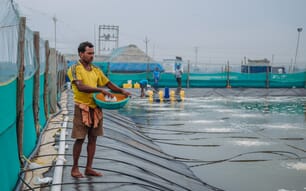
The research, conducted with support from the David Suzuki Foundation – which has long been opposed to net pen salmon farming in British Columbia – has just been published in the Proceedings of the Royal Society B: Biological Sciences,
“This study suggests that salmon farms increase the exposure of wild fish to disease, adding to the mounting evidence that they put the salmon Canada hopes to recover at risk,” said David Suzuki Foundation marine conservation specialist Kilian Stehfest. “It makes no sense to continue to use public waters for this activity.”
Pisciricksettia salmonis bacteria were among the most frequently found pathogens in all three years of sampling. These bacteria can cause blood poisoning disease in salmon, leading to lethargy, loss of appetite and erratic behaviour like uncoordinated swimming. Fish can also exhibit lesions and haemorrhages in internal organs, skeletal muscles and brains.
The study indicates that these bacteria may be more widespread in the Discovery Islands than previously thought and – according to the Foundation – “contradicts Fisheries and Oceans’ conclusion that an outbreak is unlikely, undermining the assertion that these bacteria pose minimal risk to wild salmon”.
“With the lowest sockeye salmon returns on record, it is more critical than ever to prevent wild salmon from being exposed to infectious agents from open net-pens,” Stehfest said.
“Uncertainty should inspire precaution. The study’s findings further highlight the importance of applying a precautionary approach when making management decisions based on incomplete evidence with high levels of uncertainty. Fisheries and Oceans failed to do this when it decided not to remove the Discovery Islands salmon farms by the deadline set by the Cohen Commission,” he added.
The full article, published under the title Environmental DNA from multiple pathogens is elevated near active Atlantic salmon farms, is now available via Proceedings of the Royal Society B: Biological Sciences.



